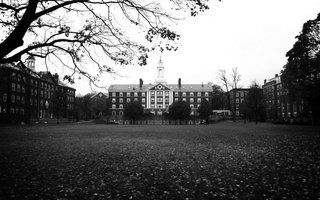HOW MANY Harvard students can you stuff into a telephone booth?
Replace the phone booth with the college's house system and you've got the joke University Hall has been playing on undergraduates since the end of August.
Juniors in Winthrop House have no conception of what a common room is, several students in Dunster call seminar rooms with no toilets "home," and seniors are developing fond sardine memories to take with them upon graduation from Lowell House. Harvard's houses are packed to the gills.
It didn't have to come to this. The end of almost all off-campus housing and the integration of transfer students directly into the 12 houses was a perfectly good idea that should have been implemented long ago. In theory, the building of the DeWolfe St. complex was supposed to accomodate the resulting overflow.
But administrative bungling and lack of coordination among those responsible for the house system has produced an unacceptable imbalance of space and students among Harvard's dorms. Policy must be different next fall, and it is up to those who live in the houses, who pay close to $3000 for that privilege each year and over $22,000 to the University overall, to influence that change.
Under the current system, it is nearly impossible for administrators to accurately forecast overcrowding in the houses. Numbers of inter-collegiate transfers, inter-house transfers, and leaves of absences are not known until the end of summer. Assistant to the Currier House Masters Patricia Pepper says, "Crowding is funny. It kind of goes with the moon."
The accepted explanation for this year's housing woes doesn't even approach the true roots of the problem. In an interview with The Crimson last month, Associate Dean of the College Thomas A. Dingman '67, the administrator directly responsible for the house system, identified a drop in leave-taking as the cause for swelling numbers in the dorms. The Gulf War, it seems, caused Harvard's travellers to prefer the Charles to the Thames.
But a glance at the figures shows that this theory doesn't hold water. The Office of Career Services (OCS) reports that 86 students are currently studying for credit away from Harvard, compared to 126 last fall. This is only a difference of 40, not the kind of number you'd expect to throw an entire system out of whack.
In addition, many students take time off and then retroactively apply for credit. Others have no plans to study while away from school. So the true number is not represented in OCS's figures and the difference between this year and last may, in fact, be close to nil.
The natural alternative to Dingman's theory would attribute housing troubles to the incorporation of close to 200 transfer students into the system this fall. But that's not it either. DeWolfe St. now accounts for rooming assignments of 200 undergraduates. The overflow due to transfers should be easily compensated.
DEWOLFE WAS ALL PART of the "big plan," according to Housing Officer Catherine M. Millett.
"Big plans" usually conjure up images of a massive bureacracy with a mind of its own. The housing mess is a bastion of disunity. No central planner seems able to negotiate numbers between the individual houses.
For example, there is far from equality among house populations. While Leverett and Currier are just at capacity, Lowell is now in its "worst season ever," says Assistant to the Lowell House Masters Sheila Schimmel.
Lowell, like the other houses, had no time to prepare for the new students expected for the fall semester. While some, like Quincy, received no new transfers, Lowell was inundated with male transfers.
Lowell wasn't told whether the transfers would be men or women, and by the end of the summer almost all the male suites were filled. So now juniors and sophomores are living in groups of four in spaces designed for three. Worse yet, seniors are crowded into as many rooms as there are members of each rooming group, a practice rarely applied to those spending their final months at Harvard.
Read more in Opinion
'A Dangerous Invitation'Recommended Articles
-
House Transfer Hopefuls Apply to Make Their MoveApplications for upper-class students to transfer among the Houses were due yesterday afternoon at the 12 House offices. Although many
-
With Strict Rules, Students Stay PutSwan Sit's decision to transfer from Cabot House to Winthrop wasn't an instance of a roommate-gone-bad or an excessive hatred
-
Masters Consider More Random HousingHouse masters today will propose the most significant changes to the freshman lottery since the late 1960s, masters and administrators
-
Dudley Offers Alternative LifestyleWhile the mass of undergraduates wishing to catch a glimpse of naked classmates grace the Yard during Primal Scream, students
-
 A Debate on Housing
A Debate on Housing













